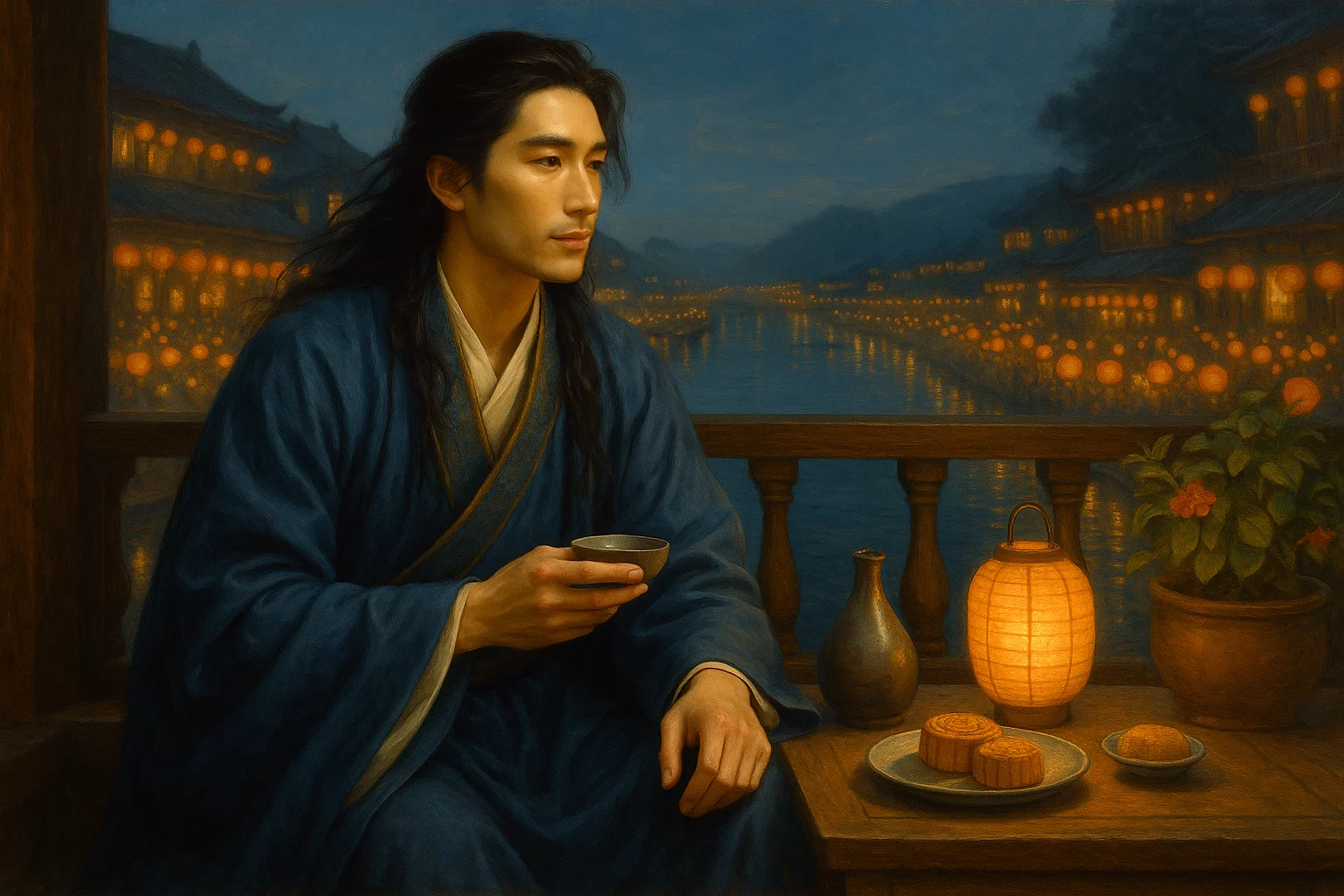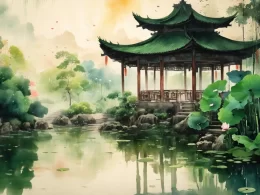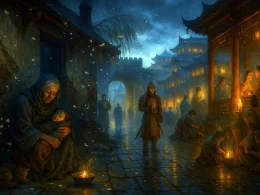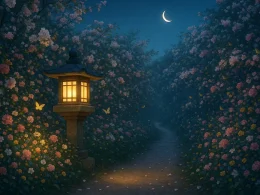Moonlight shocks crows from trembling nests,
The clepsydra drains, the well-chain protests.
She wakes—two bright stars for eyes,
Tears freeze on crimson silk, winter’s surprise.
We clasp hands as frost-winds scissor hair,
Departure lingers, but the road is there.
Farewell words clot the air.
The Big Dipper skewers the tower’s spine,
Dew bites, you’re gone, roosters mark the line.
Original Poem
「蝶恋花 · 秋思」
月皎惊乌栖不定,更漏将残,轣辘牵金井。
唤起两眸清炯炯,泪花落枕红绵冷。执手霜风吹鬓影。去意徊徨,别语愁难听。
周邦彦
楼上阑干横斗柄,露寒人远鸡相应。
Interpretation
Composed during the Yuanyou era (1086-1094) of Emperor Zhezong's reign, this ci poem captures Zhou Bangyan's emotional state while traveling abroad. The preface "Early Departure" (早行) specifies the temporal and situational setting: an autumn night nearing its end, a traveler sleepless with parting sorrow. Rather than directly expressing emotion, the poem meticulously depicts scenes and sounds before and after separation, conveying the ache of farewell through subtle imagery. Though the word "sorrow" never appears, every character pulses with unspoken feeling, making this one of Zhou's most masterful fusions of scene and sentiment.
First Stanza: "月皎惊乌栖不定,更漏将残,轣辘牵金井。唤起两眸清炯炯,泪花落枕红绵冷。"
Yuè jiǎo jīng wū qī bù dìng, gēng lòu jiāng cán, lì lù qiān jīn jǐng. Huàn qǐ liǎng móu qīng jiǒng jiǒng, lèi huā luò zhěn hóng mián lěng.
Moonlight so bright it startles crows from restless perch;
the water clock's last drips sound,
a well-pulley creaks in dawn's hush.
She wakes with eyes bright yet tear-glazed—
pearls on crimson pillow grow cold.
The stanza constructs a pre-dawn soundscape where celestial and domestic intersect. The "startled crows" (惊乌) mirror human unrest, while the "well-pulley's creak" (轣辘牵金井)—a mundane dawn sound—becomes a temporal marker of impending separation. The transition indoors reveals the woman's "tear-glazed" eyes (泪花) and the "crimson pillow" (红绵), where warmth and intimacy have turned cold with sorrow. Zhou's genius lies in making objects (pillow, pulley) vessels for unspoken emotions.
Second Stanza: "执手霜风吹鬓影。去意徊徨,别语愁难听。楼上阑干横斗柄,露寒人远鸡相应。"
Zhí shǒu shuāng fēng chuī bìn yǐng. Qù yì huái huáng, bié yǔ chóu nán tīng. Lóu shàng lán gān héng dǒu bǐng, lù hán rén yuǎn jī xiāng yìng.
Hands clasped as frost-wind lifts her hair;
my steps falter at the threshold,
parting words too bitter to voice.
From the railings, the Dipper's handle tilts—
dew chills, he departs, roosters echo farewell.
The physicality of "hands clasped" (执手) and "frost-wind" (霜风) makes the moment visceral, while "steps falter" (徊徨) captures the paralysis of imminent separation. The unspeakable "parting words" (别语) resonate louder in their suppression. The cosmic perspective—"Dipper's handle tilts" (斗柄横)—frames human sorrow against celestial indifference, and the closing "roosters echo" (鸡相应) stretches the farewell across vast auditory space, making absence palpable.
Holistic Appreciation
This ci operates on multiple temporal planes: the water clock's mechanical time (更漏), the Dipper's celestial time (斗柄), and roosters' diurnal time (鸡鸣). Within this temporal architecture, Zhou suspends a single human moment—the breath between night's end and day's beginning, between togetherness and separation.
The poem's emotional power derives from its restraint. Rather than depicting tears during farewell, Zhou shows their aftermath—the "cold" (冷) left behind on the pillow. Instead of lamenting distance, he lets space speak through the "echoing roosters" (鸡相应), their calls measuring the growing void between lovers. This indirect approach exemplifies classical Chinese poetry's "meaning beyond words" (言外之意) aesthetic.
Artistic Merits
- Horological imagery
The water clock (更漏), well-pulley (轣辘), and roosters (鸡) form a precision chronometry of parting. - Thermal symbolism
The progression from "moonlight" (月皎) to "frost-wind" (霜风) to "dew-chill" (露寒) traces emotional cooling. - Astronomical framing
The tilting Dipper (斗柄横) lends cosmic perspective to human transience. - Auditory perspective
The well-pulley's creak and roosters' calls create stereo-spatial depth, mapping emotional distance through sound.
Insights
Zhou's poem demonstrates how profound emotions are best conveyed through precise, objective details—a principle resonating with modernist "show, don't tell" aesthetics. The "cold" left on the pillow is both physical fact and emotional metaphor, akin to Hemingway's famous "clean, well-lighted place" as existential metaphor.
For contemporary creators, the poem offers a masterclass in emotional compression. Zhou achieves depth not by expanding description but by intensifying selection—each image (the crow, the pulley, the Dipper) serves multiple functions: narrative progression, emotional subtext, and structural unity.
Ultimately, the work suggests that true farewells are measured not in grand gestures but in mundane phenomena—the creak of a well-pulley at dawn, the tilt of a constellation, the cooling trace of tears on fabric. These ephemera, Zhou shows, are the real vessels of human connection and loss.
About the Poet

Zhou Bangyan (周邦彦 1056 - 1121), a native of Qiantang (modern Hangzhou, Zhejiang), was the culminating master of the wanyue (graceful and restrained) ci poetry of the Northern Song Dynasty. A virtuoso in musical temperament, his ci are renowned for their opulent refinement and technical perfection. He created dozens of new melodic patterns (cipai) and adhered to strict tonal rules, earning him the title "Crown of Ci Poets." His influence extended to Southern Song masters like Jiang Kui and Wu Wenying, establishing him as the founding patriarch of the Rhymed Ci School.












